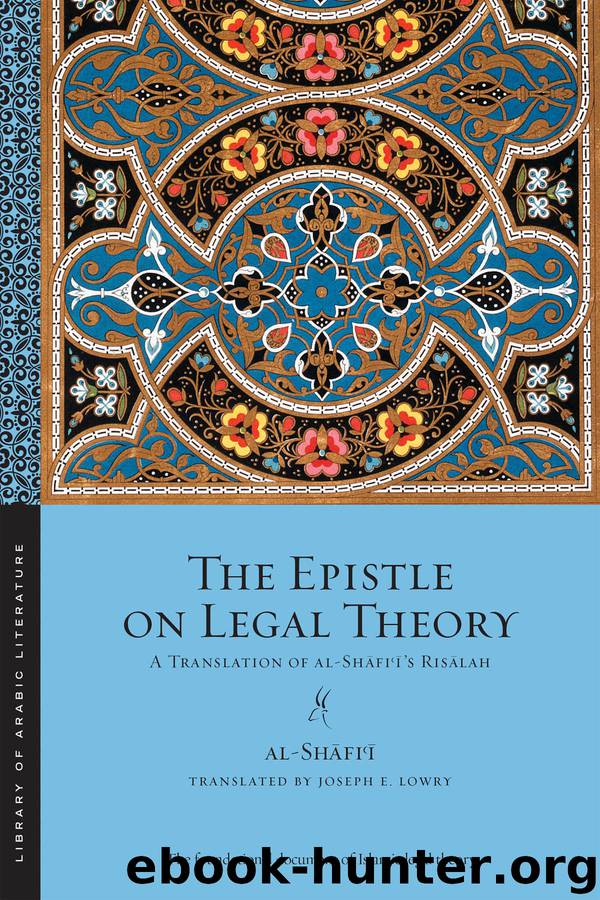The Epistle on Legal Theory by Shāfiʻī Muḥammad ibn Idrīs Lowry Joseph E

Author:Shāfiʻī, Muḥammad ibn Idrīs,Lowry, Joseph E.
Language: eng
Format: epub
Publisher: New York University Press
Published: 2015-03-14T16:00:00+00:00
CHAPTER ON KNOWLEDGE
434
Al-Shāfiʿī said: Someone asked me: “What is knowledge? What knowledge is incumbent on people?” Knowledge is of two kinds, I replied: knowledge of the general public, which any person who has reached his majority and who is of sound mind may not ignore. “Like what?” he asked. Like the five prayers, I replied, and that God is owed the fast of Ramadan, the Pilgrimage to the Sacred House if one is able, and alms from their property, and that unlawful sexual intercourse, homicide, theft, and wine are outlawed. God’s servants are legally responsible for them, they must understand them, perform them, give them freely of themselves and their property, and refrain from doing what is outlawed. That category of knowledge in its entirety is found in explicit texts in the Book of God and is widely extant among the adherents of Islam. Great masses of them pass it down from the great masses of them who went before, relating it from God’s Emissary. They dispute neither the fact that it is passed down in this way nor about the fact that it is obligatory for them. Moreover, it is not possible to be mistaken about the reports that convey such general knowledge or to engage in speculative interpretation in regard to it. Neither are disputes concerning it permissible.
435
“What,” he asked, “is the second kind?” It is the subsidiary obligations that apply to God’s servants, I replied, and the particular rulings among them, and other things for which there is no explicit scriptural prooftext and, for the most part, no explicit account of a practice, even though some small part of it might be covered by such a practice, which would belong to the category of reports within the competence of specialists, not to that of reports for the general public. This is also the case for whatever is susceptible to speculative interpretation and gleaned by means of analogy. “Does that second kind of knowledge remain mandatory in the way that the first kind of knowledge is? Is the requirement that one know it set aside for people except to the extent that they undertake it as an extra act of devotion, such that whoever omits to take it up is not considered to have sinned through its omission? Or is there some third aspect that you could adduce, based on a report or analogy?”
436
There is indeed a third aspect, I replied. “Describe it for me, then,” he said, “and cite the authority for it, what is binding, who is bound, and who is not bound thereby.” This is a level of knowledge to which the general public does not have access, I said, nor have all of those specially concerned with it been charged with it. As for those specially concerned with it who are able to have access to it, it is not possible for all of them, as a whole, to let it lapse.303 If a sufficient number of such persons takes it up, then those
Download
This site does not store any files on its server. We only index and link to content provided by other sites. Please contact the content providers to delete copyright contents if any and email us, we'll remove relevant links or contents immediately.
Machine Learning at Scale with H2O by Gregory Keys | David Whiting(4313)
Killers of the Flower Moon by David Grann(4055)
Oathbringer (The Stormlight Archive, Book 3) by Brandon Sanderson(3214)
Will by Will Smith(2920)
Once Upon a Broken Heart by Stephanie Garber(2859)
Guns, Germs and Steel by Diamond Jared(2371)
It Starts With Us (It Ends with Us #2) by Colleen Hoover(2367)
Borders by unknow(2315)
Friends, Lovers, and the Big Terrible Thing by Matthew Perry(2230)
The Room Where It Happened by John Bolton;(2159)
The Color of Law by Richard Rothstein(1948)
A Short History of War by Jeremy Black(1848)
HBR's 10 Must Reads 2022 by Harvard Business Review(1844)
The Strength In Our Scars by Bianca Sparacino(1843)
A Game of Thrones (The Illustrated Edition) by George R. R. Martin(1745)
Water Rights and the Environment in the United States by John Burch(1687)
515945210 by Unknown(1667)
Examples & Explanations: Administrative Law by William F. Funk & Richard H. Seamon(1646)
That Every Man Be Armed by Stephen P. Halbrook(1583)
